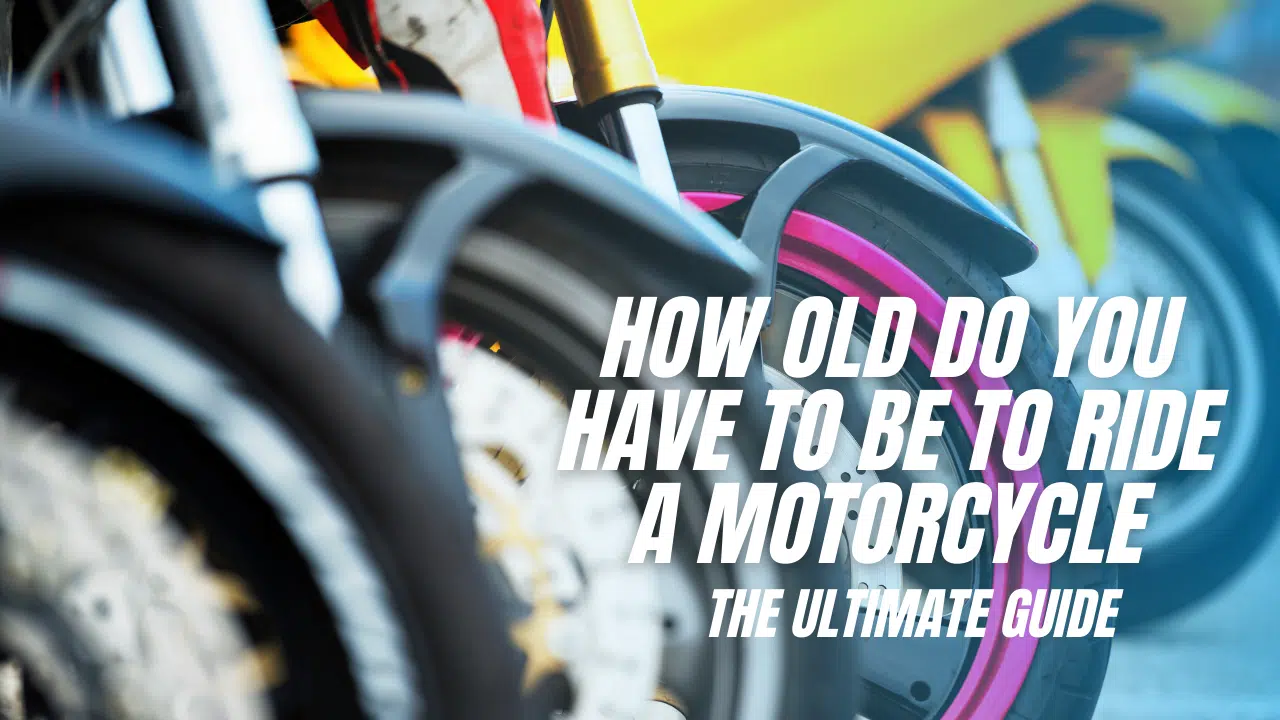Motorcycles are a lot of fun, but there are some things that you need to know before you hit the open road. In this blog post, We will answer the question: how old do you have to ride a motorcycle? We will also provide a comprehensive guide on everything you need to know about motorcycles, including licensing requirements and safety tips. So whether you are a seasoned rider or just starting, this blog post is for you!

What are the requirements to ride a motorcycle in your state?
The minimum age requirement to ride a motorcycle is 16 years old in most states. However, some states have different requirements for riding a Motorcycle. For example, in California, you must be at least 21 years old to ride a Motorcycle. In Texas, the minimum age requirement is 18 years old.
In addition to the minimum age requirement, there are other requirements that you must meet to ride a motorcycle. For example, you must have a driver’s license or learner’s permit. You must also wear a helmet when riding a Motorcycle.
If you are under 18 years old, your parent or guardian must sign a consent
If you are younger than the required age in your state, you may still be able to ride a motorcycle if you have a motorcycle instruction permit. To get a motorcycle instruction permit, you must pass a knowledge test and a skills test.
The best way to learn how to ride a motorcycle is by taking a safety course. You can find a safe riding course in your area by visiting Motorcycle Safety.
How do you get a license to ride a motorcycle?
A motorcycle permit is the first step in becoming a licensed motorcycle rider. The process for getting a motorcycle license may vary depending on your age and state of residence, but there are some general steps you can take to get started.
To ride a motorcycle, you need to have a driver’s license. In most cases, this means passing a written motorcycle test and a driving skills test.
Motorcycle licenses can be obtained in two ways: by taking a safety course or through the Department of Motor Vehicles (DMV) office. Both are offered at local community colleges, technical schools, and online courses. The cost is usually around $100 – $200 depending on your location.
The Motorcycle safety course is offered by the Motorcycle Safety Foundation (MSF) and approved for licensing requirements in all 50 states. If you’ve never taken this before, we recommend it as a great way to learn more about riding safely while getting your license at the same time! The cost varies depending on where you live but typically ranges from $75 – $300.
The DMV test is the other option and Can be taken at most state licensing agencies. The exam usually consists of a written portion (which you can study online) and a skills test, which you’ll have to take at a local DMV office. Note that some states don’t require the skills test if you’ve already taken the motorcycle safety course.
Once you’re ready, you can apply for your license by filling out an application at a DMV office near where you live or online through their website. The cost varies depending on how many times it takes but typically runs between $35 and $75 per try (you may have up to three attempts). If you’re a minor, your parent or guardian will need to sign the application.

How much does Motorcycle cost?
Motorcycles can be expensive, and the cost varies depending on the make and model. In general, you can expect to pay anywhere from $500 to $20,000 for a new motorcycle. Of course, there are always exceptions; for example, if you want a high-end sports bike or Harley Davidson, the price tag will be much higher.
Used motorcycles can be a great option if you’re on a budget; you can find good deals online or at used motorcycle dealerships. Just make sure to have the bike inspected by a mechanic before purchasing it to ensure no hidden problems.
In addition to the cost of the Motorcycle itself, you’ll also need to budget for insurance, licensing fees, and other associated costs. It was essential to research and compare rates before purchasing motorcycle insurance; you can find good deals if you shop around. Licensing fees vary from state to state but typically cost between $25 and $100.
What is the cheapest motorcycle?
There is no definite answer to this question because the cheapest motorcycle available for sale depends on the country or region. However, some motorcycles are known to be more affordable than others.
One of the most affordable types of motorcycles is the scooter. Scooters are often less expensive than regular motorcycles, and they are also smaller and easier to handle. If you are looking for a cheap bike that is still practical and fun to ride, a scooter may be the right choice for you.
Another option for a cheap motorcycle is a used bike. You can find it in various price ranges, so it is essential to research before purchasing. However, if you are lucky enough to find a good deal on a used bike, it can be a great way to save money.
Finally, if you are looking for the cheapest possible motorcycle, there are always auctions and classifieds websites to find deals on a used bike. Just be sure to read the reviews of any bike you are considering buying, and always inspect the bicycle before purchasing it.
So, what is the cheapest motorcycle? The answer to this question depends on your individual needs and budget. However, various options are available for those looking for an affordable bike.
What are the benefits of riding a motorcycle?
There are many benefits to riding a motorcycle, including:
- You can get where you need to go faster.
- Motorcycles are more fuel-efficient than cars. It can save you money on gas.
- Motorcycles are cheaper to buy and maintain than cars.
- You can take your Motorcycle off-road, which cannot be possible with a car.
- Motorcycles are fun to drive!

What are the risks of riding a motorcycle at different ages?
There is no definitive answer to this question as it depends on the individual and their experience riding motorcycles. However, there are general risks associated with riding a Motorcycle at different ages. For instance, younger riders may be more prone to injuries in the event of an accident due to their lack of experience and maturity.
Additionally, older riders may be more susceptible to health problems from long-term motorcycle riding. As with most things in life, it is essential to consider the risks and rewards of riding a motorcycle at different ages before making a decision. Ultimately, only you can decide when you are ready to start riding a Motorcycle. If you have any questions or concerns about your age, please consult with a licensed physician or contact the Motorcycle Safety Foundation (MSF) for more information.
How to stay safe when riding a motorcycle?
There is no definitive answer to this question. The age at which you can start riding a motorcycle will depend on your skill and maturity level, as well as the specific laws in your state or country. However, there are some general guidelines that you can follow to increase your safety when riding a motorcycle.
First, always wear protective gear while riding. It includes a helmet, gloves, boots, and total body armor (such as leathers or other heavy-duty materials). Ensure that you have all of these items in good condition before going out on the road.
Second, make it a point to never drive under the influence of alcohol or drugs. These substances can impair your judgment and reaction time, making it more challenging to stay safe while riding.
Finally, always ride defensively. Anticipate the actions of other drivers and be prepared to take evasive action if necessary. Remember that motorcycles are much smaller than cars so that you will have less protection in the event of a collision. Be alert at all times and stay aware of your surroundings.
Following these tips will help you ride safely and responsibly, no matter your age. Stay safe out there!

Conclusion: Motorcycle riding is a thrill that many people enjoy. However, there are age restrictions for motorcycle riders in the US and other countries worldwide. When you’re buying or renting your next motorcycle, make sure you know what rules apply where you live! We hope these steps are helpful to you and any other riders who might be reading our blog post about motorcycle detailing. Have fun out there!





